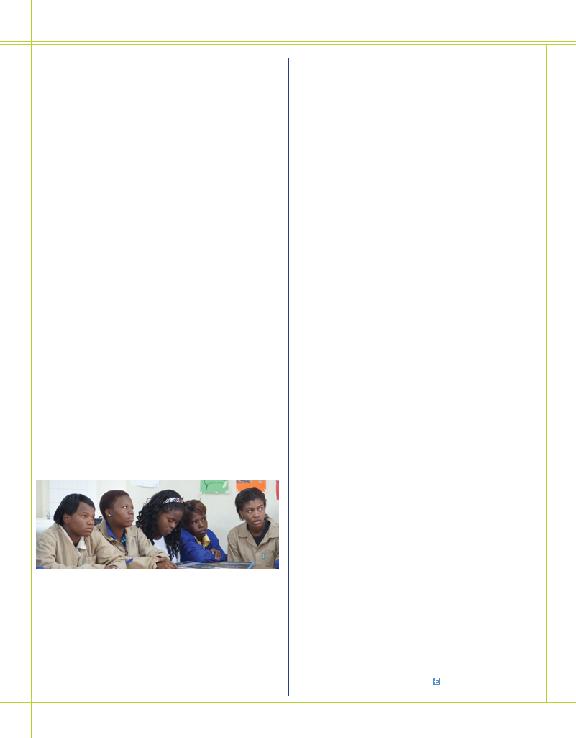
see quick results. One of the reasons why I started this program is
because you saw quick program results in Rogers Park in Chicago.
We didn't have that much impact because the kids aren't paying
much attention. You kind of need to get them to focus before you
actually teach some of those concepts. So we will see how we go
because our age ranges from 14 to 22. A youth that comes into
our program at 22, we are saying that, potentially, that child or
not really a child, that young adult is going to be in a program till
they are 27.
business techniques, i.e., how to market their products after they
graduate from the program? Is there a follow-up after the training
program to see how they are progressing?
taken and contextualized for South African students. It's called
The National Foundation for Teaching Entrepreneurship in youth
and the title of it is, Small Business Development and Operations.
They learn everything from how to start a business to how do you
identify a market. They also get to learn the difference between
just starting a business and being an entrepreneur; they learn
about the creativity it takes in identifying gaps in the market.
These are things that they have already done. For example, one
of our youth started a business selling firewood. How she did it is
that she noticed that because of all these power cuts people are
using firewood to cook. But firewood is not easy to get in a high
density suburb in the city. So what she does is that, she goes to the
factories and collects free of charge, old wooden pallets, then she
breaks those up and she turns them into fire wood and she sells
those. Nobody told her about this but this is a child who figured it
out, saw a gap in the market, and took advantage of the gap. Now,
that's an entrepreneur.
need to run a business, and also the planning that you need in
order for that business to grow and be meaningful because they
have already proved that they can make money. So what we are
trying to do is to get them to make money in a better and more
sustainable way. So that's the business that they learn. We do
that for a year and then they start learning the practical skills: the
beekeeping, the candle-making and gardening. Within that, they
are implementing their business skills. For example, they recently
took those candles with very little direction from the staff, and they
went out and they sold the candles. The candles make a profit
enough to go and buy more wax and come back and make more
candles. Now what happened is that, when they went with the
second batch of candles they went back to the same customers
who then asked for credit. They gave them credit; people wouldn't
pay them for their candles. So they quickly learned about, how
do you extend credit? What's a credit? What's a credit-worthy
customer? And these are all things they have learned in the
classroom but that they had no concept of until they went out and
practiced them. So we are able to self-assess and evaluate as we
go along.
those big foundation dollars. But, we have had two grants from
two foundations, and we continue to look at foundation sources
of funding. It's a sort of a catch-22 where you kind of have to
prove yourself before a foundation will invest in you because the
foundation investment tends to be a lot bigger. And, that goes with
time. So right now, we are dependent on amazing individuals in the
US like you, who will attend events when we have them. People will
give us big gifts when they can. We have been very lucky in that,
we have met some generous people who have given us big gifts
and continue to renew those gifts. So you know, this year, we are
looking to just expanding the network a little. So we are attracting
a lot more outside of the Chicago area and we have had some
pretty great reception. People are excited about the organization.
the success of the cottage industry and the youth really taking
the helm of the organization. I wanted to create something that
a community of youth that was isolated and marginalized could
claim as their own, something that specifically takes care of their
needs and recognizes that they are contributing members of
society. So, for me, it will be the replication and the continuation
of that idea that these youths continue to take care of each other
and recognize each other, and help each other as they make
that passage into adulthood. The reality on the ground and in all
developing countries, even in the US, is that, employment for youth
is important, but it's not going to be found in conventional ways.
You need to be innovative, and to be creative on how you bring
about this opportunity.
twice a year but I am good on email.